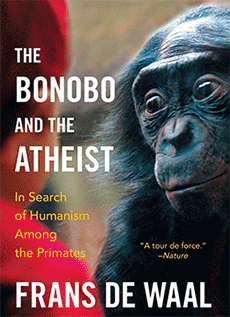Over the last few decades, the study of primate behavior has moved the consensus away from human uniqueness in politics, culture, and morality as well as from a reluctance to ascribe emotion to animals. Professor de Waal will examine similarities between humans and other primates in power politics, transmission of knowledge and habits, and moral prerequisites, such as empathy and the sense of fairness. Based on his team’s research on apes, monkeys, and elephants at the Yerkes Primate Center, the Democratic Republic of the Congo, Thailand, and elsewhere, de Waal will focus on specific, well-defined behavioral mechanisms that permit the complex social organization and extensive cooperation observed in monkeys, apes, and humans.
“De Waal’s most hopeful message is that peaceful behavior can be learned. This important and illuminating book [Our Inner Ape] should help our own species take that lesson in civility to heart.”
— Temple Grandin, The New York Times
Dr. Frans de Waal is C. H. Candler Professor of Psychology at Emory University and Director of the Living Links Center at the Yerkes National Primate Center. He is also Distinguished Professor at the University of Utrecht. He is the author of Chimpanzee Politics (1982), which compared chimpanzees involved in power struggles with human politicians, and most recently, The Bonobo and the Atheist (2013) and Are We Smart Enough to Know How Smart Animals Are? (2016). His scientific work has been published in journals such as Science, Nature, and Scientific American. He has been elected to the National Academy of Sciences (US), the American Academy of Arts and Sciences, and the Royal Dutch Academy of Sciences. In 2007, he was selected by Time as one of The Worlds’ 100 Most Influential People Today, and in 2011 by Discover as among 47 (all time) Great Minds of Science.
More Information >>






